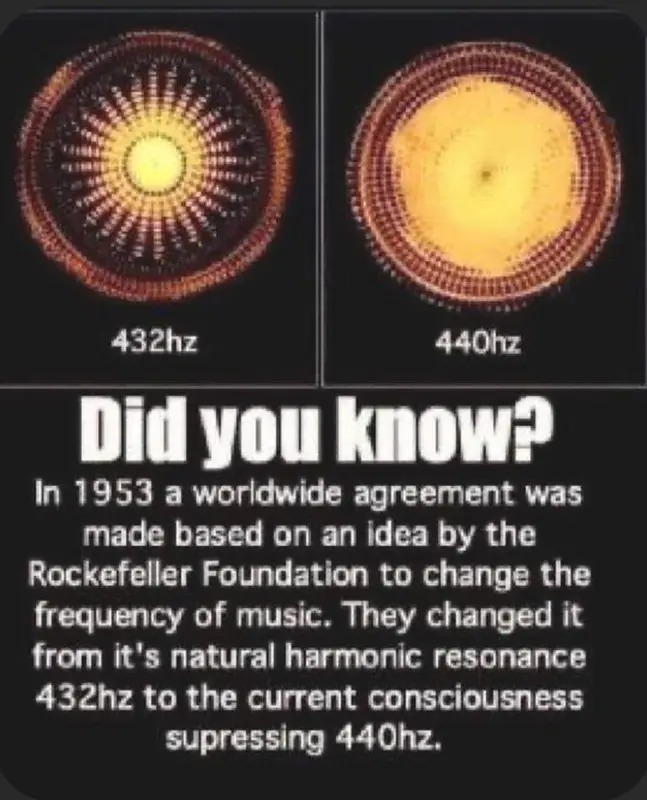
The fact that we tune our instruments to A = 440hz instead of 432hz or -- the even more common 435hz -- has nothing to do with either the Rockefeller Foundation or "suppressing consciousness".
This should also go without saying, but water does not have a memory, either.
The whole meme is stupid from its premise on up.
Pitch names like A, Bb, F#, etc., are just the labels we give to different frequencies of sound.
Taking almost everything interesting out of it and defining it as scientifically as possible, music itself is little more than a intentionally created sequence of interrelated frequencies comprising some kind of a pattern across time.
No frequency is inherently better than another, and while different materials do have resonant frequencies,
there's nothing stopping anyone from playing that frequency whenever they want;
very few materials are all that specific or consistent, simply because stuff is generally pretty impure.
For example, the bathroom stalls in my high school resonated around Bb, so they'd hum back at you if you hummed the right pitch... but I'm pretty certain that the Bb I would hum in there wasn't exactly 466.164hz.
In any case, the actual history of why we define A4 on a piano as 440hz is pretty simple.
Particularly since the Baroque era of the 18th century, musical composition was becoming more and more formalized and complex.
Gone were the days of neumatic music and chant, and even instrument-makers were becoming more professional and consistent as they built horns, viols, harpsichords, pianofortes, and so on.
This created a pretty obvious need for musicians to standardize their tuning decisions. If a composer wanted a whole orchestra to play an A, everybody had to be playing the SAME "A", otherwise they're all out of tune with each other.
So... Different standards started to emerge from different parts of Europe. The French and the Austrians seemed to like A = 435hz, but there were a lot of different preferences floating around.
Then Johann Scheibler invented "tonometer" using a bunch of tuning forks which made it easier to accurately measure the frequency of sound, and in 1834, the Society of German Natural Scientists and Physicians agreed on an international standard of A = 440hz.
This hasn't been without its detractors, but honestly, the A440 standard was basically ubiquitous in Europe by the 1900s, and it got officially adopted in the US in 1936 by the ANSI.
Today, it's the standard recognized by the ISO (which is a non-governmental organization founded in 1947 that establishes global standards in tons of different fields) and has been since 1955.
https://www.iso.org/standards-catalogue/browse-by-ics.html
A440 is the base frequency for how we tune (most) all of our instruments in Western music, and if you're playing a piano, it's the note that tuners typically start out with -- also known as A4 -- before they tune everything else to that.
There is nothing inherently important about 432hz. It's just a pitch that would sound to your ear as a slightly flat A, but not flat enough to actually be called "Ab", which is the name we use to describe the frequency 415.305hz.
The whole Rockefeller conspiracy theory angle on this is so ridiculous, both because it's completely fabricated, and because it's completely irrelevant.
The names we give to the different pitches are essentially arbitrary, but it's extremely important for musicians to have a set standard, since music is a language and as with any language, we all have to agree on what the vocabulary means if we're going to try to communicate with each other.
The idea that there's something "consciousness suppressing" about A440 is just stupid.
Where there is acceptance evolution and love there is also denial and repression and pain.